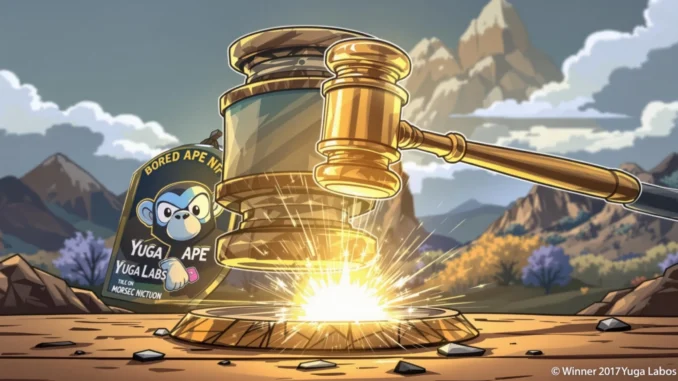
In a powerful win for the digital art and cryptocurrency world, Yuga Labs, the powerhouse behind the iconic Bored Ape Yacht Club (BAYC) NFTs, has announced the closure of the U.S. Securities and Exchange Commission (SEC) investigation into their operations. This news, delivered via an X (formerly Twitter) announcement, has sent ripples of relief and optimism throughout the NFT and broader crypto community. Yuga Labs themselves hailed it as a “huge win for NFTs and all creators pushing our ecosystem forward.” Let’s dive into what this means for Yuga Labs, the NFT space, and the ever-evolving landscape of crypto regulation.
Decoding the SEC Probe into Yuga Labs
Back in October 2022, whispers began circulating about a potential SEC investigation into Yuga Labs. While the specifics of the SEC probe were never officially disclosed by the agency, it’s widely understood that the inquiry likely revolved around whether Yuga Labs’ NFTs, and potentially the distribution of ApeCoin, constituted securities offerings. This is a critical question that hangs over many projects in the crypto space, as securities regulations carry significant compliance burdens and implications.
For nearly two years, this investigation cast a shadow over Yuga Labs and the NFT market. The uncertainty surrounding regulatory scrutiny can stifle innovation and investor confidence. The conclusion of this probe, without any enforcement action, is therefore a significant positive development.
Why is the End of the Yuga Labs SEC Probe a ‘Huge Win’?
Yuga Labs isn’t just any NFT project; they are the creators of the Bored Ape Yacht Club, one of the most recognizable and influential NFT collections globally. The BAYC brand has transcended the digital realm, becoming a cultural phenomenon with celebrity ownership, real-world merchandise, and a vibrant community. Therefore, the resolution of the Yuga Labs SEC investigation carries weight far beyond just one company.
- Validation for NFTs: The SEC closing the probe without charges can be interpreted as a tacit acknowledgment that at least in this instance, the NFTs in question are not classified as securities. This provides a degree of regulatory clarity, which is crucial for the continued growth and mainstream adoption of NFTs.
- Boost for Creator Economy: Yuga Labs’ statement highlights the win for “all creators.” A positive outcome in a high-profile case like this can encourage artists, developers, and entrepreneurs to continue building and innovating in the NFT space without the looming fear of overly broad securities enforcement.
- Investor Confidence: The removal of regulatory uncertainty surrounding Yuga Labs can bolster investor confidence not just in BAYC and other Yuga Labs projects, but in the NFT market as a whole. It signals that responsible NFT projects can navigate regulatory scrutiny successfully.
Bored Ape Yacht Club: More Than Just Digital Collectibles?
The Bored Ape Yacht Club (BAYC) collection is arguably the NFT that catapulted digital collectibles into the mainstream consciousness. Initially launched as a collection of 10,000 unique ape avatars, BAYC quickly evolved into a symbol of status, community, and digital ownership. Here’s why BAYC is so significant:
- Community Building: BAYC fostered an exclusive and engaged community around its holders. Owning a Bored Ape became a key to unlocking access to exclusive events, merchandise, and a sense of belonging in the digital world.
- Brand Expansion: Yuga Labs successfully extended the BAYC brand beyond NFTs into metaverse experiences, gaming, and real-world collaborations. This demonstrates the potential for NFTs to serve as the foundation for broader ecosystems and intellectual property.
- Cultural Impact: Bored Apes have been featured in mainstream media, music videos, and have been adopted by celebrities, solidifying their place in popular culture and demonstrating the reach of NFTs beyond niche crypto circles.
What Does This Mean for the Broader NFT Landscape?
The resolution of the NFTs probe into Yuga Labs arrives amidst a broader trend of SEC activity in the cryptocurrency space. As the original content mentions, the SEC has recently closed probes or reached settlements with other major crypto players like Robinhood, Gemini, UniSwap Labs, MetaMask, OpenSea, Coinbase, and Kraken. This raises important questions about the SEC’s overall approach to crypto regulation.
Is this a sign of a more pragmatic approach from the SEC? Or simply a reflection of individual case merits? It’s likely a combination of both. The SEC, under Chair Gary Gensler, has maintained a stance of robust enforcement in the crypto sector. However, these recent probe closures and settlements might indicate a nuanced approach, focusing on clear violations while allowing space for compliant innovation.
For the NFT market specifically, the Yuga Labs outcome is undeniably positive. It could encourage more creators and businesses to explore NFTs, knowing that responsible projects can navigate regulatory hurdles. It might also attract institutional investors who were previously hesitant due to regulatory uncertainty.
The Broader Context: SEC and Crypto Regulation
The conclusion of the Yuga Labs investigation needs to be viewed within the larger context of crypto regulation globally and specifically in the United States. The SEC’s role is to protect investors, maintain fair markets, and facilitate capital formation. Applying these principles to the novel and rapidly evolving world of cryptocurrencies presents significant challenges.
The SEC’s approach to crypto regulation has been a subject of much debate. Some industry participants argue for clearer regulatory guidelines, while others fear overly restrictive rules that could stifle innovation. The recent string of probe closures and settlements could signal a shift towards a more balanced approach, but it remains to be seen.
Key Takeaways Regarding SEC and Crypto Regulation:
- Ongoing Scrutiny: While the Yuga Labs probe is closed, the SEC’s scrutiny of the crypto space is far from over. Projects should continue to prioritize compliance and seek legal counsel to navigate the evolving regulatory landscape.
- Case-by-Case Approach: The SEC appears to be taking a case-by-case approach, rather than issuing broad blanket rules for all crypto assets. This means each project needs to be evaluated on its own merits.
- Focus on Investor Protection: Investor protection remains the SEC’s primary concern. Projects that prioritize transparency, disclosure, and fair practices are more likely to navigate regulatory scrutiny successfully.
Conclusion: A Breath of Fresh Air for NFTs and Crypto
The news of the SEC ending its probe into Yuga Labs is undoubtedly a triumphant moment for the company, the Bored Ape Yacht Club community, and the broader NFT ecosystem. It represents a significant step towards regulatory clarity and provides a much-needed boost of confidence to creators, investors, and enthusiasts alike. While the regulatory landscape for crypto remains complex and evolving, this development offers a beacon of hope and a sign that responsible innovation in the digital asset space can thrive. The future of NFTs and crypto is bright, and this news only serves to illuminate the path forward.



